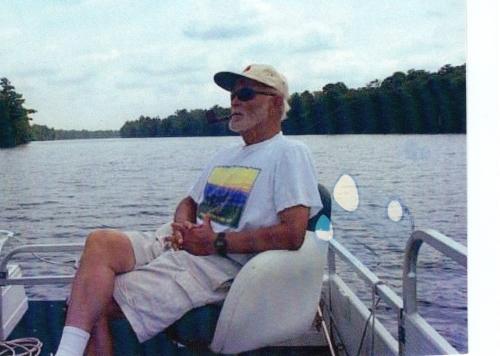Veteran Earl Locklear
Earl Locklear
Earl Locklear was born in Robeson County North Carolina on January 25, 1929. His family was Native American and was a part of the Lumbee Tribe that is located in eastern North Carolina and South Carolina. Being Native American, he was required to attend schools maintained for them by the State of North Carolina. As a young man he experienced discrimination against Native Americans. After completing high school he moved from the farm to Richmond, Virginia where he was not recognized as a Native American and for the first time experienced a life that was free of discrimination. Early in life he concluded that people acted as they did because they had been taught to behave that way.
Early life on the farm, however, produced many pleasant memories for Earl. He remembers picking cotton and harvesting tobacco. The cotton and tobacco would then be loaded onto wagons pulled by mules and taken to market. A real treat was to be allowed to ride on top of the load on the trip to where the crops were sold. On the occasions when work was finished early, he and others would go to the river where they enjoyed swimming in the cool water and fishing.
After completing high school he worked for DuPont Corporation for a year and a half. He then realized that he should complete his military obligation and he enlisted in the U. S. Air Force in 1948. The G. I. Bill was also a great incentive for Earl to enlist because of the opportunities it would provide for him after he had met his obligation.

After enlistment he was ordered to Lackland Air Force Base near San Antonia, Texas where he completed basic training. After basic training he was assigned to Fort Gordon, Georgia and to Eglin Air Force Base for advanced training that would qualify him to perform police and security duties.
Earl was then sent to the Marshall Islands in the Pacific Ocean where Eniwetok Atoll was being used extensively for the testing of nuclear bombs. He was there for six months in 1951 during Operation Greenhouse when five test bombs were exploded on the nearby Atoll. While there he provided security to Air Force planes and personnel stationed there. Because of the radioactive materials involved in operations there, Earl still receives questionnaires from the Defense Department concerning his health. After service in the Pacific he was stationed again at Elgin Air Force Base in Florida where he preformed the duties of a uniformed investigator. He was discharged from the Air Force in 1952.
When reflecting upon his military experience, Earl notes that the military afforded him the opportunity to see different parts of the United States and the Pacific area. From these experiences he was able to derive a better understanding of people from different backgrounds.
After his discharge, Earl attended college under the G. I. Bill at the Richmond Professional Institute which later became Virginia Commonwealth University, and graduated in 1956. He was certified as a Distributive Education Teacher, a program which prepared high school students to engage in retail sales. After graduation he became a teacher in Staunton, Virginia and was a classroom teacher at Robert E. Lee High School for seven years.
He then continued his education at the University of Virginia and earned a Masters Degree in School Administration in 1964. Following four years as an elementary school principal in Staunton, he became an administrator in the central office of the Staunton Public School system and performed a variety of duties until his retirement in 1988.
After retirement Earl and his wife Janet continued to live in Staunton for a while. They then moved to Willington, North Carolina so that they could be near their grandchildren. In April of 2012 they moved into Sunnyside Retirement Community. From his experiences in the military, his early life, and his teaching career, Earl has concluded that young people should be careful to avoid being swept into the culture of prejudice and the culture of greed.
As told to Bill Blair